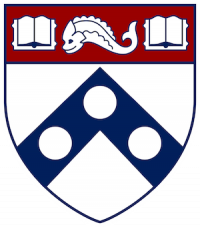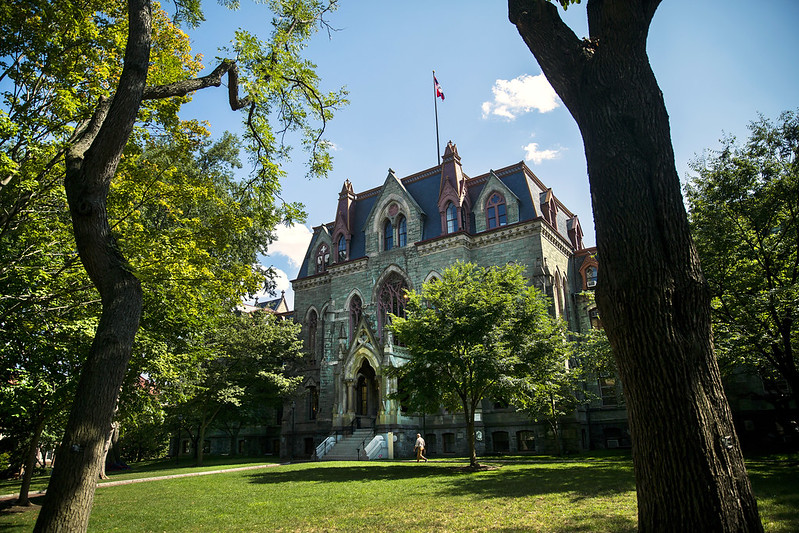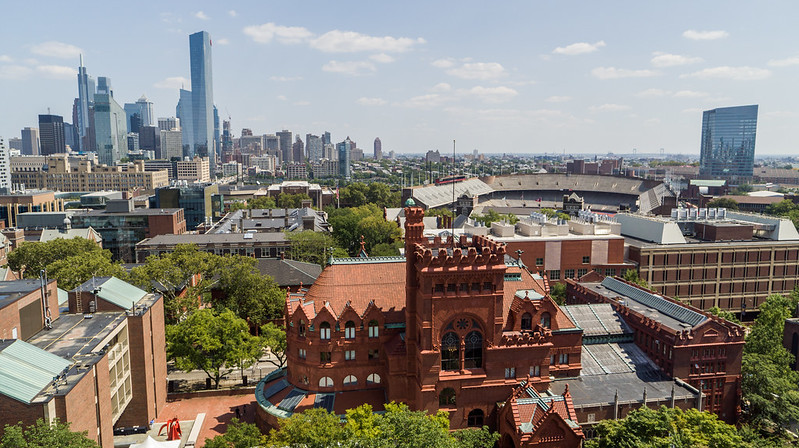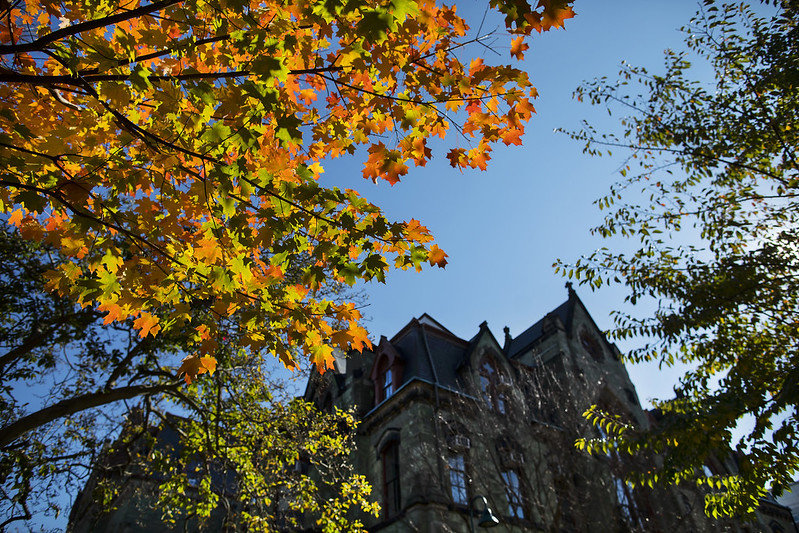The Ivy Scholars guide to UPenn’s culture, admissions, and other essential information for prospective students and their families.
Location: Philadelphia, PA
Mascot: Quaker
Type: Private Research Institution
Population: 24,800 (10,000 undergrads)

The University of Pennsylvania was founded by Benjamin Franklin in Philadelphia, PA in 1740. Its coat of arms was originally that of Franklin’s family. The first school of medicine in North America, the first collegiate business school (the highly prestigious Wharton School), and the first student union were all founded at Penn. The school is home to the Philomathean Society, the United States’ oldest continuously existing collegiate literary society.

Year Founded: 1740
4 Year Graduation Rate: 87%
Gender Distribution: 53% female, 47% male
Acceptance Rate: 9%
Residency: 24% in state, 55% out of state, 21% international
Location Type: Urban
Schedule System: Semesters
Student/Faculty Ratio: 6:1
Average Class Size: 10-19
Demographics: 43% Caucasian, 15% Asian, 8% Hispanic, 6% Black, 4% Other
US News Rankings:
Independent Rankings:
Application Deadlines:
Notification Dates:
Acceptance Rates:
Average Applicant Pool: 39,000
Average Number of Applicants Accepted: 3,700
Average Number Enrolled: 2,450
Application Systems: Common App, Coalition App
Average GPA: 3.9 weighted
SAT Scores: 25th% – 1450, 75th% – 1560
ACT Scores: 25th% – 33, 75th% – 35
*Test mandatory. Writing sections are not required.
Demonstrated Interest:
Penn does not consider demonstrated interest.
Recommendation Letter Policies:
Penn recommends two letters from academic teachers. Only one additional letter can be submitted through the application. It is highly recommended to come from someone other than a teacher who personally knows the student.
Penn Essay Prompts:
Special Notes:
QuestBridge is a National College Match program for high achieving students with significant needs.
Transfer:
Admissions Criteria:
The factors Penn considers very important are: course rigor, GPA, standardized test scores, application essay, recommendations, and character. Other important factors are: class rank, interview, extracurriculars, and talent.
An index rating of 1-9 is assigned for two criteria, GPA and standardized test scores. GPA is turned into an unweighted 4-point scale for ease of comparison. This scale includes pluses and minuses, and grades from all classes in 4 years of high school. Penn superscores SAT and ACT scores, and has no preference between the two.
Letters of recommendation are used to sort students with perfect scores who are not intellectually vibrant from those who are curious and contribute positively to the classroom. While interviews are not mandatory, the vast majority of applicants are granted one, and they can influence the decision.
What is Penn Looking For?
What Penn is looking for most is students who will fit into their cultural climate, and be able to succeed and thrive on their campus. That means first that they want students who are academically prepared for the academic work the school will expect them to do, and second students who will fit into the high-energy and academically curious student body.
Applications to each of the schools at Penn are treated separately, and the schools are looking for different things in the students they admit. Students should make sure they are applying to the school they are best suited and prepared for.
For Wharton, students should demonstrate a deep passion for and interest in business, along with displaying leadership qualities. These should be reflected in their extracurriculars. They are expected to have a high degree of math preparation, including calculus.
The School of Engineering focuses on the applied and practical side of sciences, while the College of Arts and Sciences (CAS) is more theoretical in its approach. Students should determine which of these approaches they are best suited for when applying. Engineering further expects a high level of preparation in both math and science courses, and signs the student has involved themselves in the practical side of the sciences.
The School of Nursing is looking most of all for students who are truly passionate about helping others, and the field of nursing itself. Students with no clear idea why they are interested in nursing or what the school is about are discouraged from applying.
The dual-degree programs are even more competitive, and require the highest degree of preparation. Students need to show that they would be able to succeed at two of Penn’s schools simultaneously, and that they have the drive and background to back up that claim. Penn looks for evidence of a student’s drive and ability to work in a self-directed manner.
UPenn Strategy:
Assuming a student is highly qualified, the best way to boost admissions chances for Penn is to apply Early Decision. The overall pool is smaller, and the school likes to see the level of enthusiasm and commitment required for students to apply ED.
The supplemental essays are another important place for students to talk about how they would fit in with Penn specifically. The more concrete and specific students can be about how they would be able to succeed at Penn due to the resources, courses, or peculiarities of the school, the more convincing their essays will be.
The dean of admissions’s blog suggests students talk about the specific school they are applying to, and that they use the explore interests tool to find the school and program which suits them best. Talk of academics should be balanced with discussion of how the student will fit with Penn outside the classroom, and the various clubs and opportunities they will explore. Exploring specific courses and research opportunities in your essay will let Penn know you’ve considered this decision thoroughly.
If students have a great desire to study business, but none of their activities support this, then Wharton is not the best business school to apply to. The School of Nursing has a far higher acceptance rate, but many of the students who are turned down are the ones who only apply due to its higher acceptance rate. Transferring between schools at Penn is hard, so students should determine which school they have the best chance of getting into at Penn, and whether or not they would thrive at that school before applying.
Students who apply to a dual degree program should consider which of the two participating schools they are most qualified for, and put that as their second choice. Students who are not admitted into the dual-degree program will then be considered for their second-choice school, as these programs often admit only a handful of students each year.
Enter your information below and submit for access to the guide.
Schools:
Core Requirements:
Courses of Study:
AP Credit Policies:

Honors Programs:
Research Availability:
Study Abroad:
Business Options:
Pre-Med Options:
The school is well known for its rigorous pre-med program. Undergraduate students who apply to a medical school have a 76% acceptance rate.
Pre-Law Options:
Computer Science Options:
Additional Specialty Programs:
Programs for High Schoolers:

School Motto: Laws without morals are useless
Mission and Values:
Residential Housing System:
College houses are a major part of the campus community at UPenn. Each has four members of the faculty associated with it. Some of these dorms are set aside from freshmen, but students from all of the undergraduate schools intermingle within them. There are additional subgroups within housing for students with specific shared interests.
Housing Statistics:
Campus & Surrounding Area:
Transportation:
Traditions:
Student-Run Organizations:
Sports:
Greek Life:
Nightlife:

Yearly Cost of Attendance:
Financial Aid:
Financial Aid is determined by need and UPenn gives grants that are intended to have students leave with no student debt. Although this is the goal it is understood that this isn’t always possible and therefore, students can apply for loans.
Scholarships:
Ivy League schools don’t award merit-based or athletic scholarships. Financial assistance is based on a formula that takes into account the families income to assess the level of assistance. Penn financial aid packages include grants and work-study jobs. Approximately, 48% of freshmen receive some form of aid.
While UPenn doesn’t offer scholarships they do guide their students toward outside Scholarships.

Ivy Scholars is the leading educational consultant in Sugar Land, Texas, providing admissions coaching, test prep, and more to help students enroll at top tier schools.

Call us now: +1 (281) 215-5148
.
Get expert tips, admissions updates, and resources delivered straight to your inbox.


